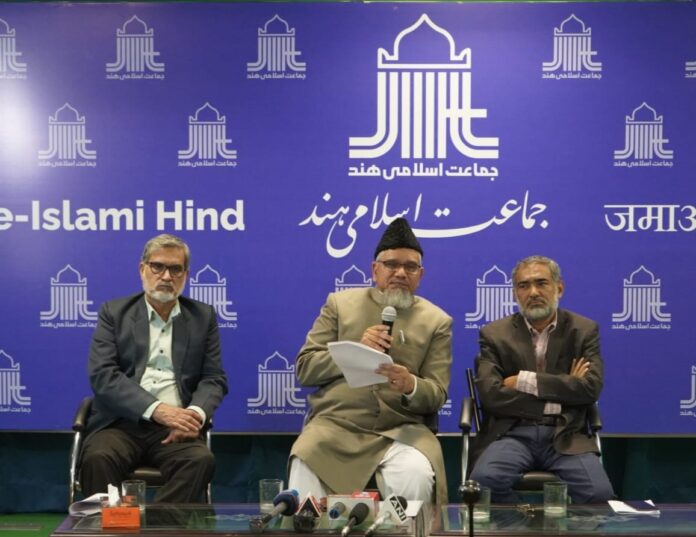
India Tomorrow
NEW DELHI—Expressing serious concern over the growing misuse of money power in national politics, Jamaat-e-Islami Hind (JIH) has urged the Election Commission of India to come up with measures to introduce transparency about donors of political parties and also ask political parties to present their accounts in the public domain.
Addressing media persons, JIH vice-president Prof. Mohammad Salim Engineer said that the issue had acquired importance after an amendment in the law that exempted the political parties from disclosing donations through electoral bonds.
He said that while the public would not know about the companies or individuals contributing to political parties through electoral bonds that were issued through the government-owned State Bank of India (SBI), the fact is that the government controlling the SBI might know everything about who contributed and how much to different political parties. In such a situation, the party in power could easily walk away with the largest share of contributions through electoral bonds.

According to ECI data, BJP got over 95 of the total electoral bonds worth Rs. 3,435 crores sold in 2019-20 and Congress received only 9 percent of the electoral bonds. According to SBI figures, the total amount collected by political parties through the electoral bond scheme has reached Rs. 10,791 crores in 2022.
Prof. Salim said that this disproportionate share of cash flow in electoral politics and that, too, in a non-transparent manner, was not healthy for our democracy. Quoting figures from a study conducted by the Centre for Media Studies, he said that the 2019 Lok Sabha elections cost about Rs. 55,000 crores, making Indian elections the costliest in the world. Prof. Salim noted that while some of this money was used during elections, it was also used post-elections to buy the support of the elected representatives of opposition parties.
He hoped that the Supreme Court, which is conducting a hearing on a petition filed by the Association of Democratic Reform (ADR) in connection with electoral bonds, would deliver its verdict in favour of fairness and transparency to strengthen democracy and introduce a level playing field in the nation’s politics.
Grant SC status to Dalit converts to Christianity and Islam
Prof. Salim made a strong case for granting scheduled caste status to Dalit converts to Islam and Christianity and extending all the benefits available to Dalits in Hindu, Sikh, and Buddhist communities. He said that Article 341 of the Constitution, which permitted granting SC status to Dalits based on their religion, was discriminatory and must be done away with it. Currently, the Constitution gives SC status only to those Dalits who follow the Hindu, Buddhist, or Sikh religions. As a result, the Dalits lose all the benefits available to a Scheduled Caste as soon as they convert to Christianity or Islam.
Referring to Rangnath Misra Commission, Prof. Salim said that the Misra Commission in 2007 had recommended that SC status be “completely delinked from religion and the Scheduled Castes should be made fully religion-neutral like Scheduled Tribes.”
The JIH leader said that a study commissioned by the National Commission for Minorities in January 2008, led by Satish Despande and a team of sociologists, submitted a report titled “Dalits in the Muslim and Christian Communities – A Status Report on Current Social Scientific Knowledge”, made a strong case for extending SC status to Dalit Christians and Dalit Muslims.
He said that the Sachar Committee had reported that the social and economic situation of Dalit Muslims and Dalit Christians did not improve after conversion. Prof. Salim noted that this also indirectly called for SC status for Dalit Muslims and Christians. He said that while social status might change by converting from one religion based on caste structure to another not recognizing, this did not mean that their economic and financial position would change overnight with embracing a new religion. As Dalits in Hindu society had been subjected to suppression for thousands of years, their economic condition would not change within months and years of shifting to a new religion. Hence, Scheduled Caste benefits available to Hindu, Sikh, and Buddhist Dalits can also be extended to Muslim and Christian Dalits.
He hoped a new commission under the chairmanship of KG Balakrishnan, appointed by the Modi government, would correctly look into the issue and ensure equal treatment for Dalits who became Christians and Muslims.
JIH Media secretary Syed Tanveer Ahmed was also present in the press conference.





[…] Jamaat-e-Islami Hind Expresses Grave… […]